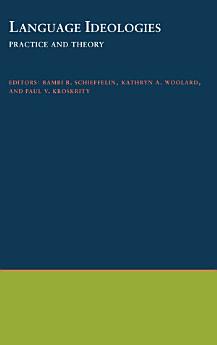Language Ideologies: Practice and Theory
Bambi B. Schieffelin · Kathryn A. Woolard · Paul V. Kroskrity
ພ.ພ. 1998 · Oxford University Press
ປຶ້ມອີບຸກ
352
ໜ້າ
family_home
ມີສິດ
info
reportບໍ່ໄດ້ຢັ້ງຢືນການຈັດອັນດັບ ແລະ ຄຳຕິຊົມ ສຶກສາເພີ່ມເຕີມ
ກ່ຽວກັບປຶ້ມ e-book ນີ້
"Language ideologies" are cultural representations, whether explicit or implicit, of the intersection of language and human beings in a social world. Mediating between social structures and forms of talk, such ideologies are not only about language. Rather, they link language to identity, power, aesthetics, morality and epistemology. Through such linkages, language ideologies underpin not only linguistic form and use, but also significant social institutions and fundamental nottions of person and community. The essays in this new volume examine definitions and conceptions of language in a wide range of societies around the world. Contributors focus on how such defining activity organizes language use as well as institutions such as religious ritual, gender relations, the nation-state, schooling, and law. Beginning with an introductory survey of language ideology as a field of inquiry, the volume is organized in three parts. Part I, "Scope and Force of Dominant Conceptions of Language," focuse on the propensity of cultural models of language developed in one social domain to affect linguistic and social behavior across domains. Part II, "Language Ideology in Institutions of Power," continues the examination of the force of specific language beliefs, but narrows the scope to the central role that language ideologies play in the functioning of particular institutions of power such as schooling, the law, or mass media. Part III, "Multiplicity and Contention among Ideologies," emphasizes the existence of variability, contradiction, and struggles among ideologies within any given society. This will be the first collection of work to appear in this rapidly growing field, which bridges linguistic and social theory. It will greatly interest linguistic anthropologists, social and cultural anthropologists, sociolinguists, historians, cultural studies, communications, and folklore scholars.
ໃຫ້ຄະແນນ e-book ນີ້
ບອກພວກເຮົາວ່າທ່ານຄິດແນວໃດ.
ອ່ານຂໍ້ມູນຂ່າວສານ
ສະມາດໂຟນ ແລະ ແທັບເລັດ
ຕິດຕັ້ງ ແອັບ Google Play Books ສຳລັບ Android ແລະ iPad/iPhone. ມັນຊິ້ງຂໍ້ມູນໂດຍອັດຕະໂນມັດກັບບັນຊີຂອງທ່ານ ແລະ ອະນຸຍາດໃຫ້ທ່ານອ່ານທາງອອນລາຍ ຫຼື ແບບອອບລາຍໄດ້ ບໍ່ວ່າທ່ານຈະຢູ່ໃສ.
ແລັບທັອບ ແລະ ຄອມພິວເຕີ
ທ່ານສາມາດຟັງປຶ້ມສຽງທີ່ຊື້ໃນ Google Play ໂດຍໃຊ້ໂປຣແກຣມທ່ອງເວັບຂອງຄອມພິວເຕີຂອງທ່ານໄດ້.
eReaders ແລະອຸປະກອນອື່ນໆ
ເພື່ອອ່ານໃນອຸປະກອນ e-ink ເຊັ່ນ: Kobo eReader, ທ່ານຈຳເປັນຕ້ອງດາວໂຫຼດໄຟລ໌ ແລະ ໂອນຍ້າຍມັນໄປໃສ່ອຸປະກອນຂອງທ່ານກ່ອນ. ປະຕິບັດຕາມຄຳແນະນຳລະອຽດຂອງ ສູນຊ່ວຍເຫຼືອ ເພື່ອໂອນຍ້າຍໄຟລ໌ໄໃສ່ eReader ທີ່ຮອງຮັບ.







